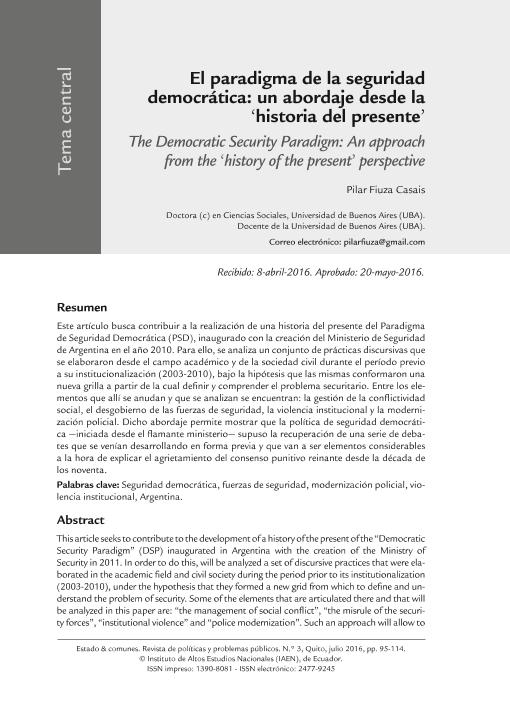Mostrar el registro sencillo del ítem
dc.contributor.author
Fiuza, Pilar

dc.date.available
2020-09-22T14:38:00Z
dc.date.issued
2016-07
dc.identifier.citation
Fiuza, Pilar; El paradigma de la seguridad democrática: un abordaje desde la historia del presente; Instituto de Altos Estudios Nacionales; Estado & Comunes; 3; 7-2016; 96-115
dc.identifier.issn
1390-8081
dc.identifier.uri
http://hdl.handle.net/11336/114516
dc.description.abstract
Este artículo busca contribuir a la realización de una historia del presente del Paradigma de Seguridad Democrática (PSD), inaugurado con la creación del Ministerio de Seguridad de Argentina en el año 2010. Para ello, se analiza un conjunto de prácticas discursivas que se elaboraron desde el campo académico y de la sociedad civil durante el período previo a su institucionalización (2003-2010), bajo la hipótesis que las mismas conformaron una nueva grilla a partir de la cual definir y comprender el problema securitario. Entre los elementos que allí se anudan y que se analizan se encuentran: la gestión de la conflictividadsocial, el desgobierno de las fuerzas de seguridad, la violencia institucional y la modernización policial. Dicho abordaje permite mostrar que la política de seguridad democrática ?iniciada desde el flamante ministerio? supuso la recuperación de una serie de debates que se venían desarrollando en forma previa y que van a ser elementos considerables a la hora de explicar el agrietamiento del consenso punitivo reinante desde la década de los noventa.
dc.description.abstract
This article seeks to contribute to the development of a history of the present of the “Democratic Security Paradigm” (DSP) inaugurated in Argentina with the creation of the Ministry of Security in 2011. In order to do this, will be analyzed a set of discursive practices that were elaborated in the academic field and civil society during the period prior to its institutionalization (2003-2010), under the hypothesis that they formed a new grid from which to define and understand the problem of security. Some of the elements that are articulated there and that will be analyzed in this paper are: “the management of social conflict”, “the misrule of the security forces”, “institutional violence” and “police modernization”. Such an approach will allow to show that the policy of “democratic security” initiated by the brand-new ministry entailed the recovery of a set of debates that were previously being developed, and which can be considered as significant elements when explaining the cracking of the “punitive consensus” prevailing since the early nineties in Argentina.
dc.format
application/pdf
dc.language.iso
spa
dc.publisher
Instituto de Altos Estudios Nacionales
dc.rights
info:eu-repo/semantics/openAccess
dc.rights.uri
https://creativecommons.org/licenses/by-nc-sa/2.5/ar/
dc.subject
: Seguridad democrática
dc.subject
fuerzas de seguridad,
dc.subject
modernización policia
dc.subject
violencia institucional,
dc.subject.classification
Sociología

dc.subject.classification
Sociología

dc.subject.classification
CIENCIAS SOCIALES

dc.title
El paradigma de la seguridad democrática: un abordaje desde la historia del presente
dc.title
The Democratic Security Paradigm: An approach from the history of the present perspective
dc.type
info:eu-repo/semantics/article
dc.type
info:ar-repo/semantics/artículo
dc.type
info:eu-repo/semantics/publishedVersion
dc.date.updated
2020-09-17T14:46:15Z
dc.journal.number
3
dc.journal.pagination
96-115
dc.journal.pais
Ecuador

dc.journal.ciudad
Quito
dc.description.fil
Fil: Fiuza, Pilar. Universidad de Buenos Aires; Argentina. Consejo Nacional de Investigaciones Científicas y Técnicas; Argentina
dc.journal.title
Estado & Comunes
dc.relation.alternativeid
info:eu-repo/semantics/altIdentifier/url/http://revistas.iaen.edu.ec/index.php/estado_comunes/article/view/29
Archivos asociados
